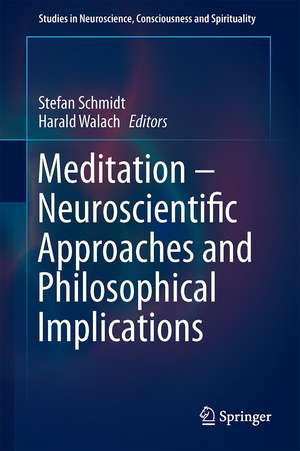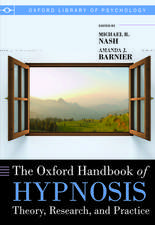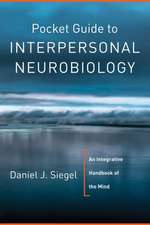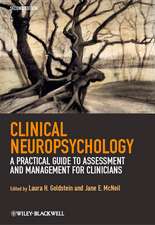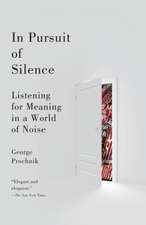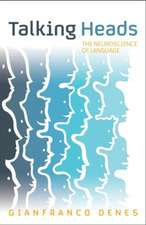Meditation – Neuroscientific Approaches and Philosophical Implications: Studies in Neuroscience, Consciousness and Spirituality, cartea 2
Editat de Stefan Schmidt, Harald Walachen Limba Engleză Hardback – 3 dec 2013
Meditation research is a new discipline that shows new inroads into the study of consciousness. If a meditative practice changes brain structure itself this is direct proof of the causal influence of consciousness onto its substrate. If different states of consciousness can be linked with properties and states of the brain this can be used to study consciousness more directly. If the sense of self is modifiable through meditative techniques and this can be objectively shown through neuro-imaging, this has profound implications for our understanding of who we are. Can consciousness, in deep states of meditative absorption, actually access some aspect of reality which we normally don't? Meditation research can potentially foster us with a new access to the phenomenological method in general. This has even been branded with a new catch-phrase: Contemplative Science. It brings together the most modern neuroscientific approach and the most advanced phenomenological methodology of studying the mind from within, through highly skilled self-observation that has gone through many thousand hours of honing the capacity to look carefully, without distraction.
This book addresses these issues by bringing together some of the leading researchers and thinkers in the field. The scope of the volume reaches from first person neuroscience to Indian philosophy, from pedagogic applications to epistemological aspects and from compassion meditation to the study of brainactivity.
| Toate formatele și edițiile | Preț | Express |
|---|---|---|
| Paperback (1) | 1004.81 lei 6-8 săpt. | |
| Springer International Publishing – 27 aug 2016 | 1004.81 lei 6-8 săpt. | |
| Hardback (1) | 1008.91 lei 6-8 săpt. | |
| Springer International Publishing – 3 dec 2013 | 1008.91 lei 6-8 săpt. |
Preț: 1008.91 lei
Preț vechi: 1230.38 lei
-18% Nou
Puncte Express: 1513
Preț estimativ în valută:
193.06€ • 206.44$ • 160.97£
193.06€ • 206.44$ • 160.97£
Carte tipărită la comandă
Livrare economică 17 aprilie-01 mai
Preluare comenzi: 021 569.72.76
Specificații
ISBN-13: 9783319016337
ISBN-10: 3319016334
Pagini: 420
Ilustrații: VI, 411 p. 28 illus., 19 illus. in color.
Dimensiuni: 155 x 235 x 28 mm
Greutate: 0.7 kg
Ediția:2014
Editura: Springer International Publishing
Colecția Springer
Seria Studies in Neuroscience, Consciousness and Spirituality
Locul publicării:Cham, Switzerland
ISBN-10: 3319016334
Pagini: 420
Ilustrații: VI, 411 p. 28 illus., 19 illus. in color.
Dimensiuni: 155 x 235 x 28 mm
Greutate: 0.7 kg
Ediția:2014
Editura: Springer International Publishing
Colecția Springer
Seria Studies in Neuroscience, Consciousness and Spirituality
Locul publicării:Cham, Switzerland
Public țintă
ResearchCuprins
Introduction: Laying out the Field of Meditation Research, S. Schmidt, H. Walach.-Towards an Epistemology of Inner Experience, H. Walach.- The Meditative Approach to Awaken Selfless Insight, W.J.H. Austin.- Meditation as First-Person Methodology: Real Promise—and Problems, J. Shear.- Using First-Person Reports during Meditation to Investigate Basic Cognitive Experience, W. Hasenkamp.- I am I from moment to moment: Methods and results of grasping intersubjective and intertemporal neurophysiological differences during Meditation states, T. Hinterberger.- Does neuroimaging provide evidence of meditation-mediated neuroplasticity? S. Clausen, et al.- Opening up Meditation for Science: The development of a meditation classification system, S. Schmidt.- The Neurobiology of Meditation and Mindfulness T. Esch.- Meditation Effects in the Social Domain: Self-Other Connectedness as a General Mechanism? F-M. Trautwein, et al.- Mindfulness Meditation and the Experience of Time, M. Wittmann and S. Schmidt.- Meditation and Hypnosis at the Intersection between Phenomenology and Cognitive Science, M. Lifshitz, et al.- Insights from Quiet Minds: The Converging Fields of Mindfulness and Mind-Wandering, M.D. Mrazek, et al.- Can Contemplative Science Bring Meditation to (Western) Life? N.A.S. Farb.- Spiritual Phenomena as Public Goods: Exploring Meditation beyond the Standard Model, T. Falkenberg.- Does Meditation Give Us Unique Insight into Ultimate Reality? The Ethical Aim of Buddhism, H. Edge.- God or Ultimate Reality in Theory and Practise - A Philosophical Analysis, A.L.C. Runehov.- The Concept of Tri-Guna: A Working Model, M. Puta and P. Sedlmeier.- Meditation – a link to spirituality and health. A novel approach to a human consciousness field experiment E. van Wijk, et al.- Mindfulness in German Schools [MISCHO] – A specifically Tailored Training Program: Concept, Implementation and Empirical Results Vera Kaltwasser, S. Sauer, N. Kohls.
Textul de pe ultima copertă
This volume features a collection of essays on consciousness, which has become one of the hot topics at the crossroads between neuroscience, philosophy, and religious studies. Is consciousness something the brain produces? How can we study it? Is there just one type of consciousness or are there different states that can be discriminated? Are so called “higher states of consciousness” that some people report during meditation pointing towards a new understanding of consciousness?
Meditation research is a new discipline that shows new inroads into the study of consciousness. If a meditative practice changes brain structure itself this is direct proof of the causal influence of consciousness onto its substrate. If different states of consciousness can be linked with properties and states of the brain this can be used to study consciousness more directly. If the sense of self is modifiable through meditative techniques and this can be objectively shown through neuro-imaging, this has profound implications for our understanding of who we are. Can consciousness, in deep states of meditative absorption, actually access some aspect of reality which we normally don't? Meditation research can potentially foster us with a new access to the phenomenological method in general. This has even been branded with a new catch-phrase: Contemplative Science. It brings together the most modern neuroscientific approach and the most advanced phenomenological methodology of studying the mind from within, through highly skilled self-observation that has gone through many thousand hours of honing the capacity to look carefully, without distraction.
This book addresses these issues by bringing together some of the leading researchers and thinkers in the field. The scope of the volume reaches from first person neuroscience to Indian philosophy, from pedagogic applications to epistemological aspects and from compassion meditation to the study of brainactivity.
Meditation research is a new discipline that shows new inroads into the study of consciousness. If a meditative practice changes brain structure itself this is direct proof of the causal influence of consciousness onto its substrate. If different states of consciousness can be linked with properties and states of the brain this can be used to study consciousness more directly. If the sense of self is modifiable through meditative techniques and this can be objectively shown through neuro-imaging, this has profound implications for our understanding of who we are. Can consciousness, in deep states of meditative absorption, actually access some aspect of reality which we normally don't? Meditation research can potentially foster us with a new access to the phenomenological method in general. This has even been branded with a new catch-phrase: Contemplative Science. It brings together the most modern neuroscientific approach and the most advanced phenomenological methodology of studying the mind from within, through highly skilled self-observation that has gone through many thousand hours of honing the capacity to look carefully, without distraction.
This book addresses these issues by bringing together some of the leading researchers and thinkers in the field. The scope of the volume reaches from first person neuroscience to Indian philosophy, from pedagogic applications to epistemological aspects and from compassion meditation to the study of brainactivity.
Caracteristici
Provides specific methods and methodological problems in meditation research Offers a unique overview of current approaches of meditation research by leading authors in the field First volume in this field to cover first person approaches from a neuroscience and a philosophical perspective
